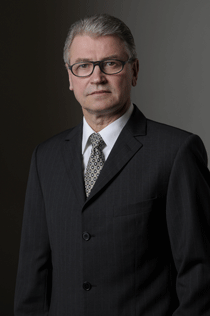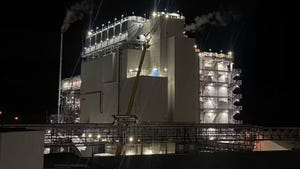B&C Q&A #1: Talking construction with Jürgen Arnold
Population growth and climate change have turned water into a scarce resource. The infrastructure measures required to meet the resulting demand over the long term imply higher sales of plastics products, such as pipes. The top executive at one of the world's leading extrusion systems manufacturers, Jürgen Arnold, CEO of battenfeld-cincinnati Holding GmbH (Bad Oeynhausen, Germany), shared in an exclusive interview with MPW his insights into the construction industry.
November 11, 2010
Population growth and climate change have turned water into a scarce resource. The infrastructure measures required to meet the resulting demand over the long term imply higher sales of plastics products, such as pipes. The top executive at one of the world's leading extrusion systems manufacturers, Jürgen Arnold, CEO of battenfeld-cincinnati Holding GmbH (Bad Oeynhausen, Germany), shared in an exclusive interview with MPW his insights into the construction industry. Arnold's company, with manufacturing facilities in Germany, Austria, China, and the U.S., makes extrusion lines for pipe, profile, and sheet extrusion.
MPW: From your perspective as CEO of a globally active extrusion systems manufacturing company, what trends currently are impacting the construction industry?
 Jürgen Arnold, CEO of battenfeld-cincinnati Holding GmbHArnold: We have to make distinctions here because the individual applications are developing in very different ways. In the case of products for housing construction, such as profiles for windows and doors, the market continues to be subdued with no signs of growth. On the other hand, there are improved prospects in terms of sales potential with respect to infrastructure measures. Population growth, particularly in East Asia, India, and Africa, will also result over the long term in higher sales of products such as pipes for transporting water. A strong recovery is already well under way in the pipe sector, in particular, where growth of up to 50% has been recorded compared with 2009. As a result, battenfeld-cincinnati has decided to boost its capacities.
Jürgen Arnold, CEO of battenfeld-cincinnati Holding GmbHArnold: We have to make distinctions here because the individual applications are developing in very different ways. In the case of products for housing construction, such as profiles for windows and doors, the market continues to be subdued with no signs of growth. On the other hand, there are improved prospects in terms of sales potential with respect to infrastructure measures. Population growth, particularly in East Asia, India, and Africa, will also result over the long term in higher sales of products such as pipes for transporting water. A strong recovery is already well under way in the pipe sector, in particular, where growth of up to 50% has been recorded compared with 2009. As a result, battenfeld-cincinnati has decided to boost its capacities.
MPW: How do you feel about the economic environment?
Arnold: Growth markets are basically very keen to invest, but there is also a political dimension to consider. Where the state is the client, there is very little room to maneuver as a result of financial policy restrictions. Manufacturers of products required for infrastructure measures may lack the financial resources, given that credit availability remains patchy. Furthermore, different specifications have to be met depending on markets. It is an advantage if the machinery manufacturers have a local presence and make it their business to understand national conditions and manufacturers.
MPW: What is the importance of the construction industry as a customer for machinery manufacturers?
Arnold: The construction industry accounts for about two-thirds of the market for extruded plastics products.
MPW: How is machinery technology contributing to a smaller energy footprint in construction?
Arnold: Plastic pipes and profiles make a major contribution to energy efficiency in buildings. For example, low-temperature heating systems are usually combined with underfloor heating, for which plastic pipes are ideally suited. Plastic pipes are also increasingly favored for the installation of district heating systems because they have significant advantages over alternative pipe systems and ensure that energy losses in the heating system are kept to a minimum. Plastic window profiles, on the other hand, are by far the best solution for insulating window systems. The multi-chamber profile systems currently on the market offer an outstanding price/performance ratio, excellent thermal and sound insulation, plus decisive advantages over wood or aluminum windows in terms of care and cleaning and with respect to diversity of shapes and colors.
This means that plastic profiles, with their particularly high levels of dimensional stability and durability, are often the first choice for residential construction. Plastic windows are also recyclable. Other plastics products that make a significant contribution to energy efficiency can be found in the fields of solar panels and general insulation or cladding, to name but a few.
MPW: What role can be played by plastics in emerging economies, where low-cost solutions are required?
Arnold: Specifications are not necessarily the same in emerging economies and different products may be required. Here, it is population growth in particular that accounts for a large number of infrastructure measures. Water and energy will present the key challenges. Housing construction must be geared to the provision of dwellings for as many people as possible. The plastics industry has a specific role to play here in terms of providing cost-effective products.
MPW: What applications for plastics products can be identified for the construction industry in the future?
Arnold: A sizeable number of new products are increasingly being used in the housing sector while traditional materials are gradually being phased out in favor of new ones. Plastics products are replacing aluminum cladding and even roof tiles. Desalination plants require specific pipe layouts, and sales of innovative materials, such as wood plastic composites (WPC), also continue to rise, as is reflected in annual growth rates of between 18%-20%. In strategic terms, it is important to recognize market trends and respond to them.
About the Author(s)
You May Also Like


